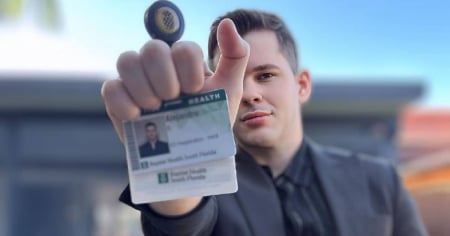Immigration lawyer Ángel Leal expressed his concern about the immigration status of Cubans holding the I-220B form in light of the new immigration policies announced by Donald Trump for January 2025.
During an interview with Juan Manuel Cao on América TeVe Miami, Leal explained that Cubans with the I-220B form face greater risks of deportation than those with the I-220A document.
"If it is I-220A, you probably will not have a deportation order, there is no danger, and you can report to Customs Control at all appointments. In the cases of I-220B, the situation is different," the lawyer stated, highlighting the vulnerability of those holding this type of document.
The I-220A form generally indicates supervised release for migrants and, in most cases, does not carry an immediate deportation order.
However, the I-220B, known as a "Supervision Order," could indicate the existence of an active or pending deportation order.
"This group of immigrants is at the highest risk of being deported. However, the controversy with Cuba has always revolved around cases with older deportation orders, which they do not accept because they have criminal records and have not been able to regularize their status under the Cuban Adjustment Act," Leal said.
He explained that in that group of individuals with criminal records who have not regularized their status, there are people who committed crimes more than a decade ago, yet they still remain under supervision order.
"That is where, in my opinion, the conflict with the regime lies, as it refuses to accept those individuals. It is important for those in such situations to be well aware of their immigration status, their pending court dates, etc.," he commented.
In light of this situation, the lawyer recommended that migrants consult with an immigration law specialist to understand their legal status and explore options that may help them avoid potential deportation proceedings.
The Cuban community in the United States continues to face legal uncertainties due to changes in immigration policies. This issue has gained importance in recent months as more Cubans arrive in the country seeking refuge and escaping repression and misery on the island.
Frequently Asked Questions about the Immigration Status of Cubans with I-220A and I-220B Forms
What is the difference between the I-220A and I-220B forms for Cubans in the U.S.?
The I-220A form indicates supervised release, typically without an immediate deportation order, while the I-220B, known as "Order of Supervision," may involve an active or pending deportation order. Cubans with an I-220B face a higher risk of deportation.
Why are Cubans with I-220B at risk of deportation?
Cubans with I-220B supervision orders may have active deportation orders, making them more vulnerable to deportation, especially under stricter immigration policies like those announced by Donald Trump for 2025.
What can Cubans with I-220A or I-220B do to improve their immigration situation?
It is crucial for Cubans with these forms to consult with an immigration attorney to understand their situation and explore legal options. Keeping all documents up to date and attending all immigration appointments is vital to avoid complications.
What role does the Cuban Adjustment Act play in the status of Cubans with an I-220?
The Cuban Adjustment Act allows Cubans to apply for permanent residency after one year in the U.S., but those with an I-220 face uncertainties because this form is not recognized as an official admission, complicating the adjustment of status process.
Filed under:
